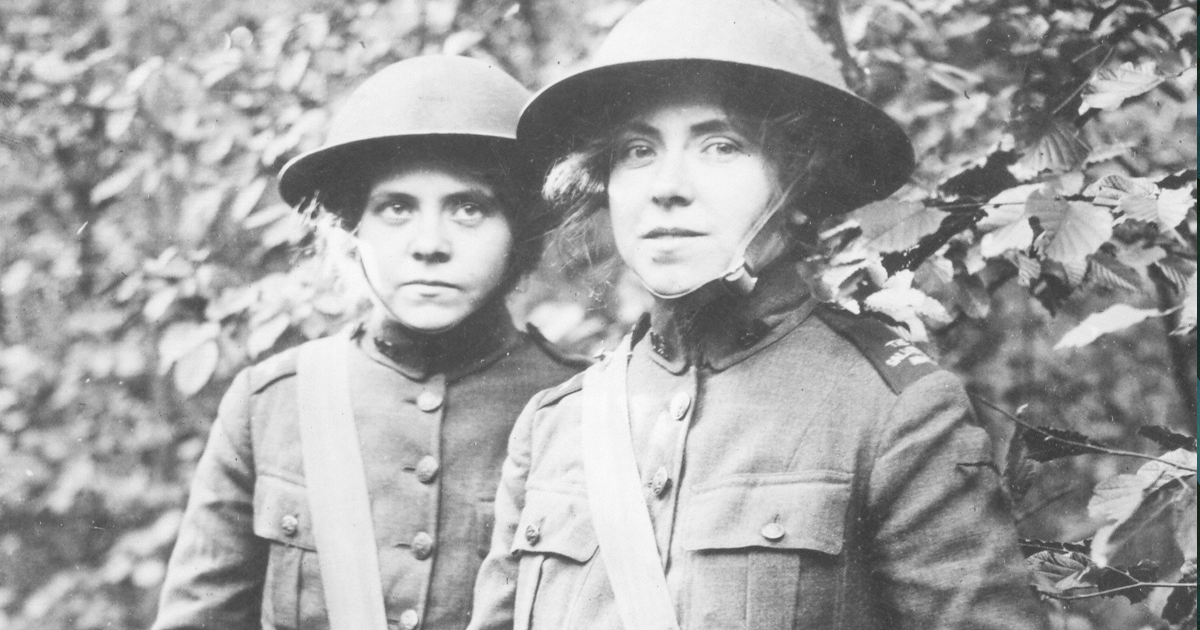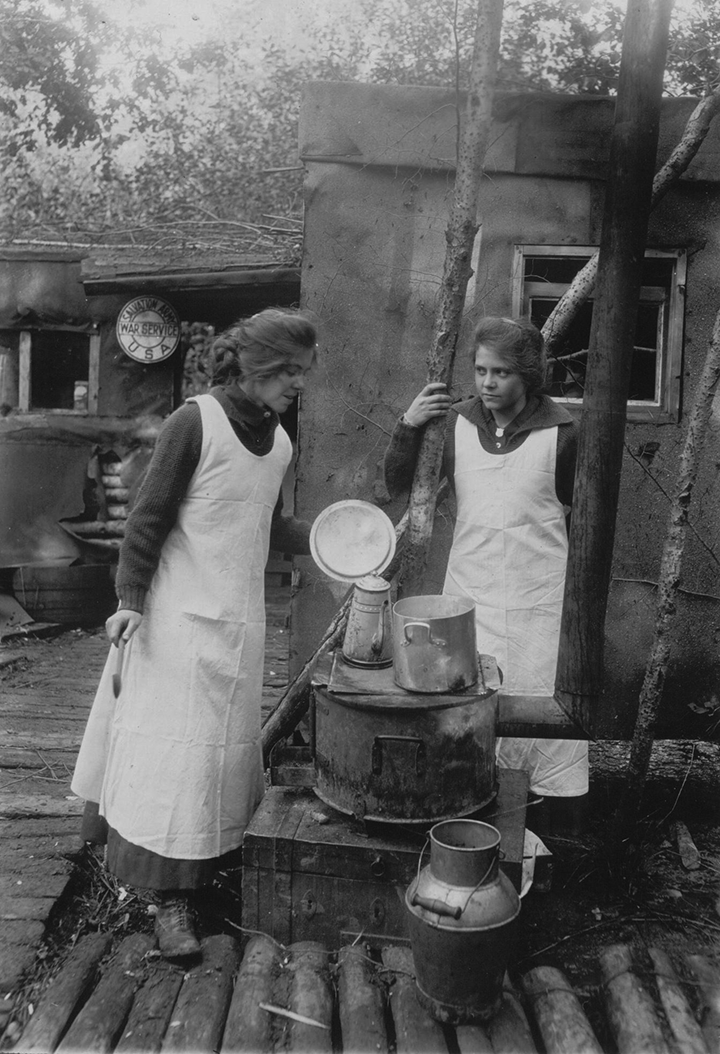Pure Grit, Pure Love
In recognition of Salvation Army week, designated annually as the second week of May, we recall the legacy of devotion and service Salvationists forged as they supported troops on the battlefields of World War I.
In recognition of Salvation Army week, designated annually as the second week of May, we recall the legacy of devotion and service Salvationists forged as they supported troops on the battlefields of World War I. The following excerpts from Alice McAllister’s diary reveal the grit and compassion such service required.
Soon after President Woodrow Wilson declared war against Germany on April 7, 1917, Evangeline Booth, daughter of Salvation Army founder William Booth, created a National War Board to help meet the needs of American soldiers.
Evangeline handpicked the officers who were to go. No men were to go that were eligible to serve in the regular forces. Single women were selected for their devotion to duty as well as their sterling character. All single women had to be at least 25 years old.
Before the first group left, Evangeline said, “You are going overseas to serve Christ. You must forget yourselves, be examples of His love, willing to endure hardship, to lay down your lives, if need be, for His sake. In your hands you hold the honor of the Salvation Army.”
Violet Virginia McAllister (1890-1939) and Alice Annette McAllister (1892-1980) joined the 1st Division of the American Expeditionary Forces after being sworn into the U.S. Army as privates–the only way for them to volunteer on the front lines of World War I. They were given nursing training before boarding a steamship to cross the ocean in March 1918.
Diary Entry: Camp life
We are now in Froissy, France where the divisional headquarters is located, waiting to find out where they are going to make a permanent base so we can get located. Yesterday we wrapped up in blankets and tried our best to keep warm, but, believe me, this is the coldest country I have ever struck.
Last night Vi and I had a room, but there was nothing in it and they had to carry up our cots and blankets for us to sleep on. This is the life alright, but I am enjoying it immensely and [am] mighty glad for the experience. We are only about 15 miles from the scene of the worst fighting that has ever been known in world history.
DIARY ENTRY: The sorrows of war
This morning there were great long lines of soldiers passing by our place on the march toward the front. There has been some terrible fighting on this British front lately and it is very pitiful to see the refugees coming along the roads with all their household goods packaged into little carts and the poor women and children walking along behind, perhaps driving a few poor old cows and horses.
Our little house is a haven for our soldiers. Even though we very often are without much food, there is always the piano and Victrola, which are in almost constant use, and there is the bog room with plenty of tables and writing paper and whatever reading matter we are able to get. There are games, too, that are in constant use. We serve the Headquarters Troops, 1st Engineers Signal Corps and any of the infantry that are not in the trenches at the moment. Many boys are very sad, and it makes our hearts ache for them. We find out that many have not heard from home in months and they are consumed with anxiety over their loved ones.
Diary Entry: With the wounded
We noticed that a lot of ambulances were passing our door all the time, and decided there must be a field hospital close by. I went out to find it and a block away, I turned a corner and there it was! Five or six large tents overflowed with wounded men and many were on stretchers outside because there was no more room and not enough ambulances to carry them away fast enough.
I hunted down one of the doctors and asked if we could help. He explained that there were so many more casualties than had been expected, they just couldn’t handle them fast enough. “If you girls could just try to keep them happy somehow until more help comes …” We telephoned our own headquarters and asked them to send some trucks to help with transporting wounded men, [and] also to send us mosquito netting to keep the flies off the wounded men. Then we both went back to the hospital, armed with washbasins and cheesecloth. We started in on the poor fellows lying outside, we washed away the mud and blood and made them as comfortable as possible.
Diary Entry: Sustained by a higher power

How can I ever describe the busy days at the field hospital! Our division was now hard at work driving the enemy back farther and farther toward their own country. It was the great drive in the Argonne Forest. The tents were filled with wounded [men] and ambulances were going and coming continually. My sister was helping give tetanus shots and making a purple “T” on each forehead to signify that tetanus had been given. I was working in the tents at my usual job of washing mud and blood from faces and hands, administering drinks of water or moistening the lips of those too badly wounded to drink. Sometimes we worked far into the night, then snatched a few hours of sleep and were up and at it again.
One day, as I worked in a hospital tent, a big shell suddenly landed in the open space in front of the tents. Immediately, we began carrying the wounded into the dugout. The shells were coming about every 20 minutes. I had just closed the door when a shell landed right where I had been standing! The shell had sunk deep into the earth before it exploded. The windows were shattered and rocks, some as big as a man’s hand, came hurdling into the room. Although the wounded were on litters all about the floor, no one was hurt.
Another shell tore off one corner of the building. Then another came, landing right on top of the entrance to the dugout, bringing down heavy timbers, rocks and dirt. One step and we would have been underneath it all.
Major Maynard looked around the room and said, “Men, you have just witnessed a miracle and I believe God has spared us because these two girls are with us.”
Diary Entry: Hard duty
The next day, we went about our work as usual. Ambulances brought in the wounded. It was inevitable that some would die. The chaplain came to tell us he would be conducting a funeral for about 25. He asked us if we would come along and sing. So we climbed to the top of the hill where a long trench had been dug and the dead placed therein. It was a heartbreaking sight. When the little service was over, the chaplain turned to a single grave, a little apart from the others. “This grave contains the body of one of our enemies, and I think it is right that we should pray beside this grave too.” I will never forget that prayer as he besought comfort for this boy’s mother and relatives, although they were our enemies. It made me realize that we are all the children of God. Our days were often made sad by the dreadful sight of men so badly wounded and we prayed for the day when it would all be over.
Diary Entry: Spring water for the wounded
One day, I was working my way up one side of a big tent full of wounded [men] and looked down into the face of a handsome young boy, probably no more than 18 or 19. He seemed to be murmuring something and I knelt down beside him and leaned closer to hear. He was saying, “Mother, Mother.” I laid my hand gently on his damp forehead and said, “What is it, son?” His eyes flew open. “Mother! I knew you would come. I knew you would come. Mother, I want a drink.” I brought water and some cotton and moistened his lips and swabbed out his mouth, for I could not let him drink as he had a machine gun bullet in his abdomen. He made a face and said, “It tastes awful!” No water around us was fit to drink. I bathed his face and hands and tried to make him comfortable. Soon he opened his eyes and said, “Mother, couldn’t you bring me a drink from the spring?”
I rushed down to the door of the tent, praying as I had never prayed before, “O God, we must have water–ice cold water from a spring.” I lifted the flap of the tent and looked up and there I saw hills surrounding us on every side. Suddenly it seemed as though a voice spoke in my mind: “I will lift up mine eyes unto the hills, from whence cometh my help” (Ps. 121:1 KJV). Of course! There must be water somewhere in the hills. I went flying across the compound to where our little Ford pickup stood and to our faithful driver and protector, Adjutant Billy Hale. “Billy,” I cried breathlessly, “Do you see those hills yonder? Well, somewhere up there, there is a spring and we must have water–ice cold water from a spring.”
I returned to my work. As the afternoon wore on, the tent flap lifted, and I beheld the beaming face of Billy Hale. In the back of the pickup truck was a large tank of the most delicious, coldest water I had tasted in many a day.
Billy said he saw some cart tracks on the main road and followed them. They led a long, long way into the hills but finally came to an end beside a spring of water gushing up out of a rock. I carried some into the tent and knelt beside the boy and whispered gently, “I have brought water from the spring.” I moistened his lips again and again and bathed his hands with that wonderful cold water. He sighed his contentment and slept again.
I gave the wonderful cold water to all who were able to drink and moistened the lips of those who could not. The doctors and hospital corps men came to the truck to drink and marvel. “Where did you get it?” asked a doctor. I said it came in answer to prayer for a boy who begged his mother to bring him a drink from the spring.
Every day while we were there, Billy brought the water down from the hills. My young lad was taken away to a hospital and my prayers went with him. I hope that God spared his life to go back home to his mother, in Indiana I think it was.
Excerpted from “The Doughnut Sweethearts: The Diary of Alice McAllister during World War I,” published by Frontier Press, Rancho Palos Verdes, CA, copyright 2012. Available at TradeWest.com.







